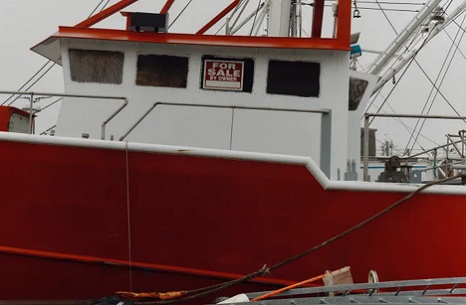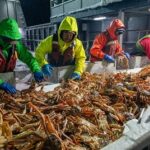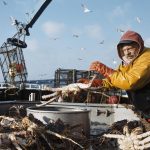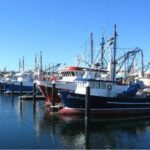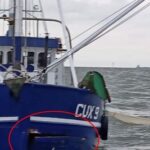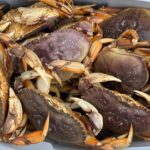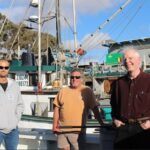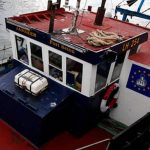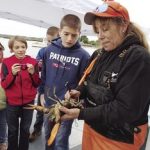Tag Archives: National Marine Fisheries Service
Coalition files intent to sue federal agencies to stop whale-killing Virginia wind project
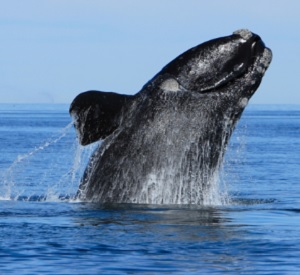 The Committee for a Constructive Tomorrow (CFACT) and The Heartland Institute today announced that they were filing with the Bureau of Ocean Energy Management (BOEM) and the National Marine Fisheries Service (NMFS) a 60 Day Notice of Intent to Sue letter for a violation of the Endangered Species Act. The violation is contained in a defective “biological opinion,” which authorizes the construction of the Virginia Offshore Wind Project (VOW). The 60-day notice is required by the Endangered Species Act (ESA) for parties who wish to commence litigation against BOEM for failure to provide adequate protection of the North Atlantic right whale and other endangered species. The North Atlantic right whale is listed as “critically endangered” by the governments of both the Commonwealth of Virginia and the United States. >>click to read<< 12:23
The Committee for a Constructive Tomorrow (CFACT) and The Heartland Institute today announced that they were filing with the Bureau of Ocean Energy Management (BOEM) and the National Marine Fisheries Service (NMFS) a 60 Day Notice of Intent to Sue letter for a violation of the Endangered Species Act. The violation is contained in a defective “biological opinion,” which authorizes the construction of the Virginia Offshore Wind Project (VOW). The 60-day notice is required by the Endangered Species Act (ESA) for parties who wish to commence litigation against BOEM for failure to provide adequate protection of the North Atlantic right whale and other endangered species. The North Atlantic right whale is listed as “critically endangered” by the governments of both the Commonwealth of Virginia and the United States. >>click to read<< 12:23
California commercial Dungeness crab fishing season delayed
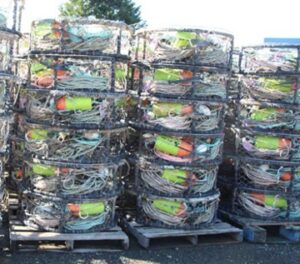 The California Department of Fish and Wildlife announced a delay in the season opener for California commercial Dungeness crab fishing off the Central and Southern Coast to protect whales from entanglement. The decision is based on a combination of excessive humpback whale entanglements in California Dungeness crab gear over the last three years and high numbers of recent humpback whale sightings off the central coast according to CDFW’s Risk Assessment and Mitigation Program criteria. Due to number of entanglements, NMFS is proposing to upgrade the California commercial Dungeness crab fishery to a Category I fishery,,, >>click to read<< 08:09
The California Department of Fish and Wildlife announced a delay in the season opener for California commercial Dungeness crab fishing off the Central and Southern Coast to protect whales from entanglement. The decision is based on a combination of excessive humpback whale entanglements in California Dungeness crab gear over the last three years and high numbers of recent humpback whale sightings off the central coast according to CDFW’s Risk Assessment and Mitigation Program criteria. Due to number of entanglements, NMFS is proposing to upgrade the California commercial Dungeness crab fishery to a Category I fishery,,, >>click to read<< 08:09
With little movement on salmon bycatch, Alaska advocates look to Biden administration for executive action
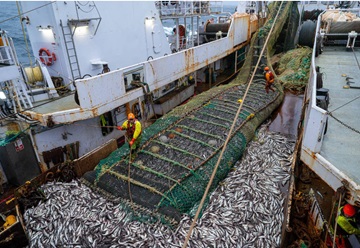 Amid catastrophic shortfalls in salmon harvests in some of Alaska’s rural, Indigenous communities, advocates have pleaded for a crackdown on unintentional catch of those same salmon by the trawl vessels that harvest billions of pounds of whitefish in the Bering Sea. But the politically appointed regional council that manages Bering Sea fisheries has largely resisted those requests. So instead, advocates are now taking another approach. They’re pushing the Biden administration for a workaround: a rewrite of the federal guidelines that tell the regional council, and its counterparts across the country, how to manage all the fisheries under their supervision. >>click to read<< 18:40
Amid catastrophic shortfalls in salmon harvests in some of Alaska’s rural, Indigenous communities, advocates have pleaded for a crackdown on unintentional catch of those same salmon by the trawl vessels that harvest billions of pounds of whitefish in the Bering Sea. But the politically appointed regional council that manages Bering Sea fisheries has largely resisted those requests. So instead, advocates are now taking another approach. They’re pushing the Biden administration for a workaround: a rewrite of the federal guidelines that tell the regional council, and its counterparts across the country, how to manage all the fisheries under their supervision. >>click to read<< 18:40
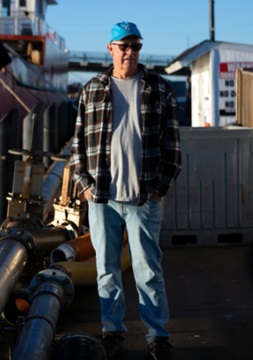
A Small Fish and an Uncollected Fee Add Up to Big-Government Challenge at the Supreme Court
The case could undercut the power of federal regulators on major issues including air pollution and securities fraud. It also exemplifies the way many of the high court’s biggest fights are born these days — driven less by the practical aims of the litigants than by the ideological vision of the interest groups behind the suits. The fight concerns a federal requirement that some herring boats host government-approved observers aboard their vessels and cover an estimated $710 daily cost. The fisherman say that would be an onerous burden on their family-owned businesses — so onerous they are suing even though the fee is on hold and might never kick in. “We have not had to pay. We’re just nervous about this hanging over our head,” said Bill Bright in an interview in Cape May, New Jersey, where he runs his two-vessel fishing business. “So we feel that we need to solve this problem now.” Photos, >>click to read<< 11:14
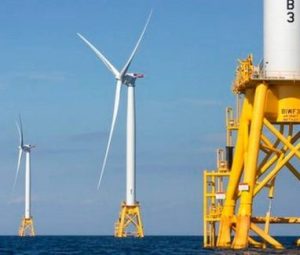
President Biden’s Offshore Wind Policies Make National Lobster Day a Day to Mourn
National Lobster Day was established by Congress to celebrate the tasty crustacean’s place in American history, culture, and commerce. Sadly, due to President Biden’s offshore wind policies, and his agencies’ blame shifting, it may soon become a day to memorialize the passing of a great industry, tradition, and a tasty meal. On December 1, President Joe Biden hosted a state dinner with French President Emmanuel Macron, at which more than 200 Maine lobsters were served. The dinner was rife with hypocrisy since earlier in his administration, Biden’s National Marine Fisheries Service, an office in the National Atmospheric and Oceanic Administration (NOAA), issued new restrictions on Maine’s lobster fishers to protect North American right whales from entanglement with lobster fishing gear. >>click to read<< 10:40
New Bedford said to be best place for National Oceanic and Atmospheric Administration
 Is there a better place to site the National Oceanic and Atmospheric Administration’s Northeast operations than New Bedford? Mayor Jon Mitchell doesn’t think so. And he’s joined in that opinion by a “very broad coalition of business and civic leadership. “Mitchell sent a letter co-signed by more than 50 business and civic leaders to NOAA Administrator Richard Spinrad this month making a pitch to consolidate its Northeast facilities in New Bedford. A similar letter was sent to NOAA in 2016, but recent developments warranted another entreaty. New Bedford’s port accounts for about 70% of the state’s commercial fish landings, according to the letter. While Gloucester hosts most of the NOAA’s facilities regionally, its landings are about one-seventh the size of New Bedford’s. >click to read< 09:54
Is there a better place to site the National Oceanic and Atmospheric Administration’s Northeast operations than New Bedford? Mayor Jon Mitchell doesn’t think so. And he’s joined in that opinion by a “very broad coalition of business and civic leadership. “Mitchell sent a letter co-signed by more than 50 business and civic leaders to NOAA Administrator Richard Spinrad this month making a pitch to consolidate its Northeast facilities in New Bedford. A similar letter was sent to NOAA in 2016, but recent developments warranted another entreaty. New Bedford’s port accounts for about 70% of the state’s commercial fish landings, according to the letter. While Gloucester hosts most of the NOAA’s facilities regionally, its landings are about one-seventh the size of New Bedford’s. >click to read< 09:54
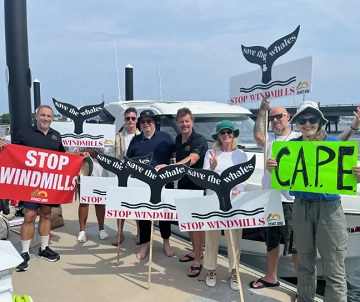
Fishermen, activists protest offshore wind farms near Montauk, cite recent whale deaths
The winds of change are blowing. Conservative activists, environmentalists and New Jersey fishermen protested the construction of wind turbines off the East Coast on Monday, highlighting increasing whale deaths in the region that they say are tied to offshore renewable energy. The coalition, organized by the Committee for a Constructive Tomorrow, sent out three boats to South Fork Wind Farm, roughly 20 miles from both Martha’s Vineyard and Montauk, NY, holding signs that read “STOP WINDMILLS SAVE WHALES” while shouting through a bullhorn at machinery operators to halt construction. The National Oceanic and Atmospheric Administration (NOAA) in 2017 declared an “unusual mortality event” for humpback whales found dead on beaches from Maine to Florida. The agency has recorded 57 large whale strandings since December 1, 2022 on the Atlantic coast. Twelve occurred in New York; nine were discovered in New Jersey. Photos, >click to read< 09:04
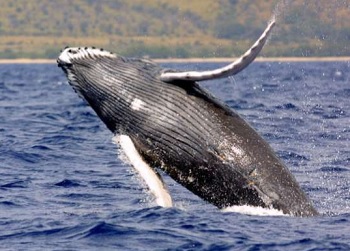
Federal fisheries service agrees to deal aimed at curbing whale entanglements in fishing gear
A legal agreement finalized Tuesday over the protection of humpback whales is expected to help the threatened animals thrive while maintaining the ocean’s health. The deal stricken between the National Marine Fisheries Service and Center for Biological Diversity will create a team to reduce the number of whales that get tangled in a West Coast federal fishery. The service will form the team by Oct. 31, 2025, a press release stated. A federal court in March sided with the center after it filed suit last year against the fisheries service. The center argued the service failed to protect Pacific humpback whales from getting entangled in sablefish pot gear off the California, Oregon and Washington coasts. >click to read< 09:33
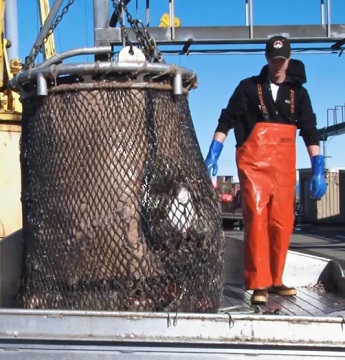
‘It’s Just Not a Fair Fight’: Supreme Court to Hear Case that Could End Bureaucratic Rule
“There’s going to be plenty of trips where that monitor will make more than myself or my crew,” said Stefan Axelsson, a commercial fisherman. He and other herring fishermen from Cape May, New Jersey sued over the rule and their case will be heard by the Supreme Court next term, where it will be argued by famed appellate lawyer Paul Clement. “When you have the federal government regulating small businesses it’s just not a fair fight,” Clement recently told The Hugh Hewitt Show. However, instead of just hearing the specifics of this case alone, justices have chosen to take on the bigger issue by reviewing the power of the entire federal bureaucracy. Specifically considering one of the most important, and powerful, principles in the world of bureaucratic rulemaking known as the “Chevron doctrine.” >click to read< 14:02
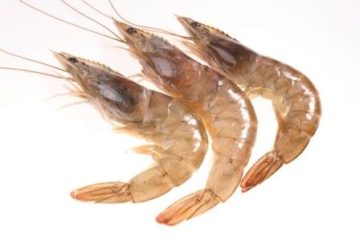
Commercial Gulf Shrimp season reopens Saturday
The Gulf of Mexico commercial shrimp season for state and federal waters will reopen 30 minutes after sunset on Saturday, July 15, 2023. “The annual mid-May closure protects brown shrimp until they can reach larger, more valuable sizes during their major period of emigration from the bays to the Gulf of Mexico,” said Robin Riechers, TPWD Coastal Fisheries Division director. Federal waters (from nine to 200 nautical miles offshore) will open at the same time as state waters. The National Marine Fisheries Service chose to adopt rules compatible with those adopted by Texas. >click to read< 16:41
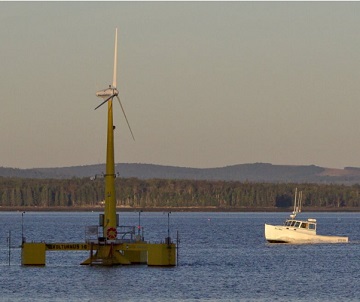
U.S. Rep. Jared Golden introduced a bill in Congress that would prevent offshore wind development in key fishing area
The bill would prevent the federal Bureau of Ocean Energy Management from potentially hurting the fishing and lobstering industries in Maine, said Golden, D-2nd District. The legislation also would launch an assessment of how federal agencies like the BOEM and the National Marine Fisheries Service study the effects of offshore wind development and engage with industry groups. Lobster Management Area 1 is the zone closest to the shores of Maine and stretches along the entire coast. That’s where Virginia Olsen, a commercial lobsterman and director of the Maine Lobstering Union, says a majority of Maine fishing and lobstering is concentrated. “I think this is the exclusion zone that the Maine Lobster Union and the area that the (Maine Lobstermen’s Association) would agree is most important economically to the fishery,” Golden said. >click to read< 19:46

Federal judges: Data does not prove Maine lobstering endangers whales
Friday, a panel of judges ruled that data on entanglements in lobster fishing gear does not support the need for the new strict limits on where and how lobstermen could fish. Those regulations, set by the National Marine Fisheries Service, were put in place under the authority of the Endangered Species Act to protect the 340 North Atlantic Right Whales whales left. The Maine Lobstermen’s Association says there is no evidence of Maine lobster gear ever killing a whale. There has been no documented entanglement of a North Atlantic Right Whale since 2004. “Every lobsterman in Maine was facing a decision of whether or not they would be able to continue in the fishery,” MLA policy director Patrice McCarron said. Video, >click to read< 08:55
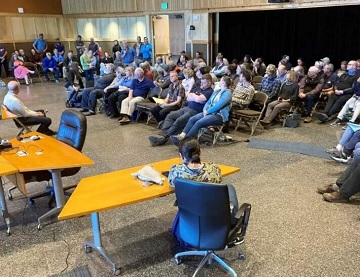
NOAA says revised analysis could allow Southeast king salmon troll fishing, despite ruling
The National Marine Fisheries Service hasn’t ruled out the possibility of opening the summer troll season for king salmon in Southeast Alaska, despite a federal judge’s recent ruling to the contrary. The service’s Alaska regional administrator, Jon Kurland, told a roomful of trollers during a June 7 meeting in Sitka that the agency was working hard to correct the problems identified in the federal lawsuit. The Wild Fish Conservancy in Washington state sued to stop the Southeast Alaska troll season, seeking to protect endangered Southern Resident killer whales’ food sources. >click to read< 12:57
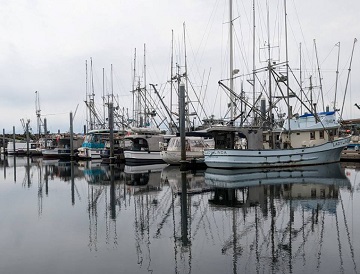
‘It’ll be a disaster’: Southeast Alaska fishermen fear looming closure of king salmon fishery
“I’m optimistic, but I’m also scared as heck,” said Eric Jordan, a lifelong fisherman and resident of trolling stronghold Sitka at the standing room-only meeting with federal National Marine Fisheries Service officials. The closure of the king salmon fishery in Southeast Alaska would be economically devastating, according to many in the region who rely on the valuable fish for their annual income. A federal judge in Washington state effectively shut down the fishery in May in response to a lawsuit brought by Wild Fish Conservancy, a Washington organization. The suit contends that the fishery should be closed to protect endangered killer whales in Puget Sound that feed on chinook salmon. >click to read< 11:46
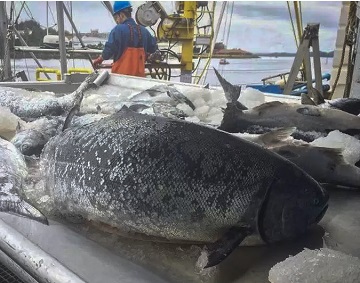
DOJ will appeal court order forcing Southeast Alaska king salmon troll fishery closure
The United States Department of Justice will appeal a federal court order forcing the closure of the commercial king salmon troll fishery in Southeast Alaska. In early May, Washington U.S. District Court Judge Richard Jones upheld an earlier recommendation that the Southeast summer and winter king fisheries were catching too much of the food source of a dwindling population of Puget Sound’s Southern Resident killer whales, in violation of the Endangered Species Act. The defendant intervenors in the case, the Alaska Trollers Association and the State of Alaska, filed motions earlier this month calling for a “partial stay” of the order, pending an appeal to allow the fisheries to proceed. >click to read< 15:58

First Lawsuit Over Whales and Wind Dismissed
A federal district judge in Massachusetts has rejected an effort to stop an offshore wind project near Nantucket Island on the basis of danger to whales, apparently the first court test of similar claims being raised against wind turbine proposals along the U.S. eastern seaboard, including here in Virginia. On May 17, U.S. District Judge Indira Talwani granted a motion for summary judgement to the federal agency that approved the Vineyard Wind One project. With a planned 84 turbines, the project is about half the size of Dominion Energy Virginia’s planned project off Virginia Beach. Both are just the first phases of larger planned buildouts. The same judge is hearing the other cases, with the two from fishing interests now combined. >click to read< 09:47

Feds play shell game with wind / whale impacts
NOAA is taking public comments on a massive proposal to harass large numbers of whales and other marine mammals by building a huge offshore wind complex. There is supposed to be an Environmental Impact Statement (EIS) for the proposed harassment, but it is not there with the proposal. We are told it is elsewhere but after searching we find that it simply does not exist. Like a shell game where the pea has been palmed, there is nothing to be found. First the bureaucratic background. The wind project is Dominion’s 2,600 MW offshore Virginia facility, which if built would be the world’s biggest. NOAA’s National Marine Fisheries Service (NMFS) is proposing to issue a five year harassment authorization for the construction of this monster. >click to read< 07:36
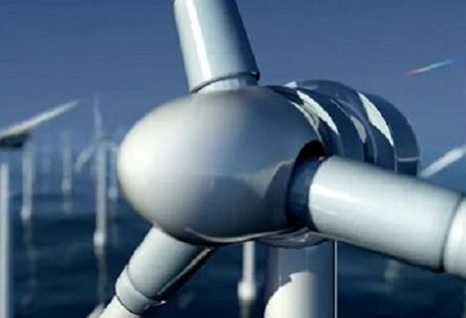
Wind project scope ‘staggering’
It wasn’t “until the whales and the dolphins started washing up that people’s attention was able to focus” on the offshore wind farms, according to Cindy Zipf, and when people looked beyond the whales, they realized what is happening is “staggering.” “I don’t think ever in the history of mankind have we proposed to industrialize an ecosystem this fast and at this magnitude,” she said. Zipf is executive director of Clean Ocean Action, a coalition of groups dedicated to protecting the ocean. Zipf acknowledges the pace at which the plans are moving forward is making efforts to slow or stop them difficult. “It’s challenging considering how fast-tracked everything is and how limited the permitting process is. It’s kind of under the jurisdiction of two people to make it happen, President Biden and Gov. Murphy,” she said. “Hopefully as more is understood there will be some more caution but as it is right now the (state and federal) agencies are very enthusiastic.” >click to read< 16:29
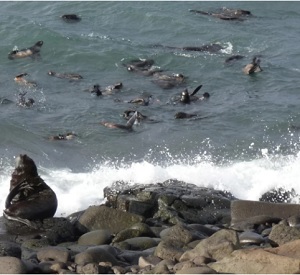
Proposed Bering Sea marine sanctuary draws pushback from fishing industry
The Aleut Community of St. Paul, the tribal government for the Pribilof Island community of around 500 people, says the sanctuary designation would give it greater authority to protect the region’s vast ecosystems and resources, including rich fishing grounds and habitat for the federally protected northern fur seal. NOAA accepted the tribe’s nomination last year, which set off panic bells in the commercial fishing industry. Many in the industry have voiced concerns that bringing in another co-manager could threaten the industry, even though NOAA and the tribe say the change would not affect fishing regulations. Commercial fishing representatives railed against the proposed sanctuary during an April 6 meeting in Anchorage, which NOAA hosted to clear up confusion within the industry. >click to read< 12:06
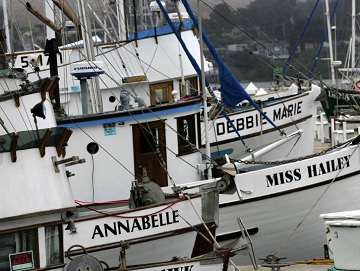
State, federal officials vow to take quick action on Federal Fishery Disaster Declaration for salmon fishing industry
State and federal officials are vowing to move quickly to secure disaster aid for Californians affected by the closure of this year’s commercial and recreational salmon season, which could have an economic impact of $1.4 billion, according to one industry group. The administration of Gov. Gavin Newsom requested a Federal Fishery Disaster Declaration from U.S. Commerce Secretary Gina Raimondo after a decision Thursday by the Pacific Fishery Management Council to recommend full closure of both commercial and recreational salmon seasons this year. It’s unclear what that might mean in terms of total dollars and eligible stakeholders. >click to read< 08:03
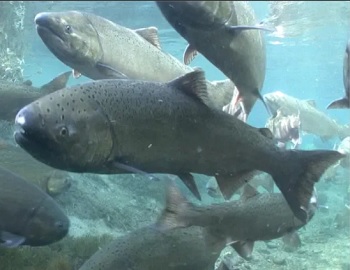
Oregon fishing season called off due to dwindling salmon populations
An extremely low “abundance” of California Chinook salmon stocks and projected low spawning escapements has led to the cancellation of the upcoming commercial and recreational salmon fishing season along most of the Oregon coast. Thursday’s announcement came in two parts from the Oregon Department of Fish and Wildlife, with both actions canceling fishing seasons between March 15 and May 15, 2023. According to Fish and Wildlife, the action applies to all commercial ocean troll salmon fishery seasons from Cape Falcon to the Oregon-California Border. Meanwhile, recreational salmon fishing has been canceled in ocean waters between Cape Falcon and Humbug Mountain off the Oregon coast. >click to read< 08:45
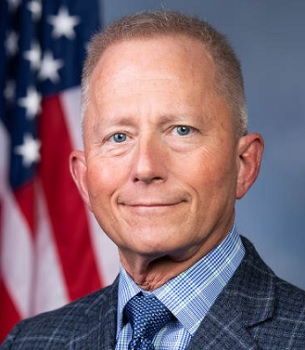
Fed Official: Offshore Wind Will Adversely Impact North Atlantic Right Whale
Ahead of his March 16 hearing on offshore wind at the Wildwood Convention Center, Congressman Jeff Van Drew is challenging the federal government and offshore wind companies to prove they have nothing to hide when it comes to negatively impacting the environment. “Hearings are critical,” he said in a statement released last week condemning President Joe Biden’s administration for “its continual lack of transparency with the American people – this time about the correlation of offshore wind development and the death of endangered whales.” Van Drew’s latest comments follow the release of a May 13, 2022 missive from Sean Hayes, chief of protected species for NOAA’s National Marine Fisheries Service. In the letter to Brian Hooker, lead biologist for Bureau of Ocean Energy Management, Office of Renewable Energy Programs, Hayes laid out how offshore wind development in New England would negatively affect the North Atlantic right whale. >click to read< 08:04

Fate of NJ Fishermen in the Hands of Supreme Court
New Jersey herring fishermen asked the Supreme Court in a final brief to rein in regulators that rely on judicial deference to circumvent the will of Congress. The fishermen are challenging the lawfulness of a regulation that could force them to hand over 20 percent of their pay to third-party at-sea monitors they must carry on their boats—a mandate that Congress never approved by statute and did not give the National Marine Fisheries Service (NMFS) the authority to require by regulation. The U.S. Solicitor General recently filed a brief with the Court urging the justices to ignore the checks and balances of the U.S. Constitution in order to preserve the controversial doctrine of Chevrondeference. >click to read the press release< 15:22
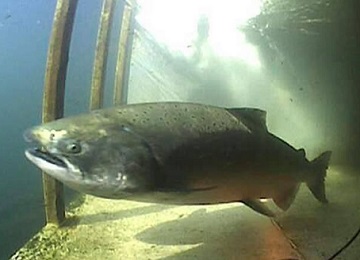
PD Editorial: Listen to fishermen: Skip salmon season
When people call for action that goes against their own short-term interests, something bigger must be at stake. The public should pay attention. So, it is with three associations of West Coast fishermen that have called for a shutdown of this year’s California salmon fishing season. Members of all three associations know that a closure will cost them dearly, but they understand that this year’s pain is the best chance for long-term survival. But the people who know salmon best and rely on them most — members of the Pacific Coast Federation of Fishermen’s Associations, the Golden Gate Fishermen’s Association and the Northern California Guides and Sportsmen’s Association — say that it’s time for a pause. >click to read< 11:44
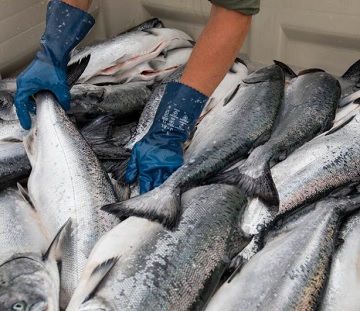
Poor outlook for king salmon could shut down California’s sport and commercial seasons
This year’s official “forecast abundance” estimates that just 169,767 adult chinook salmon are waiting off shore to be caught — a substantial decrease from the 396,458 predicted last year and forecasts above 800,000 a decade ago. A nearly 2-month delay in the Dungeness crab season this year meant commercial crabbers missed the Thanksgiving, Christmas and New Year’s holidays and then had a glut of fresh crab available when the market was weak, said veteran fisherman Dick Ogg, vice president of the Bodega Bay Fisherman’s Marketing Association, which represents the local commercial fleet. Though Ogg participates in a variety of fisheries, many locals only do salmon, crab or both. “For the guys that only have salmon as a potential income, it’s going to be devastating,” he said, “and for the guys who have salmon and crab, and who have had a minimal crab season, it’s going to be devastating.” >click to read< 09:05

Maine lobster industry wages legal battle over recent regulations, while new ones remain frozen
The Maine Lobstermen’s Association in September appealed a ruling in a lawsuit against federal regulators in which a judge rejected the association’s attempt to block the National Marine Fisheries Service’s 10-year plan to reduce the risk posed by fishing gear to North Atlantic right whales. The animals risk injury or death when they become entangled in lines or gear. The case has been moving with relative speed through the court system, with oral arguments presented in the U.S. Court of Appeals in Washington, D.C., last week. The association argued that the National Marine Fisheries Service, part of the National Oceanic and Atmospheric Administration, failed to rely on the best scientific information available and did not account for the impact of conservation measures already adopted by the Maine lobster fishery. In effect, the lobstermen argue, the federal government placed its thumb on the scale in favor of the whales. >click to read< 10:56

Federal court hears arguments from Maine lobstermen appealing right whale regulations
A federal appeals court heard arguments Friday from the Maine Lobstermen’s Association, which is challenging a government plan to regulate the fishery and conserve endangered right whales. The Maine Lobstermen’s Association had promised to take its latest appeal of federal fishing regulations all the way to the U.S. Supreme Court, if necessary. But lobstermen hope they’ll avoid that prospect, especially with Paul Clement, an attorney with more than 100 past Supreme Court appearances, representing Maine. >click to read< 07:22








